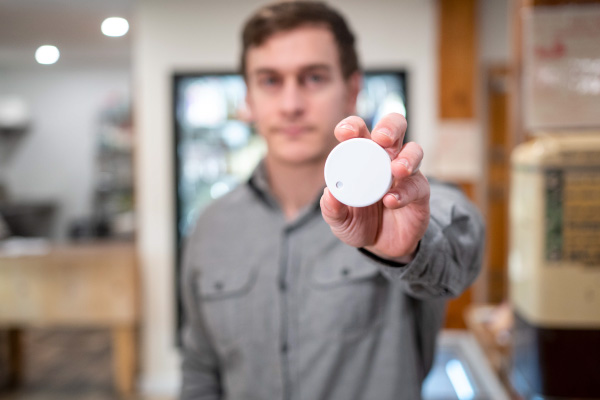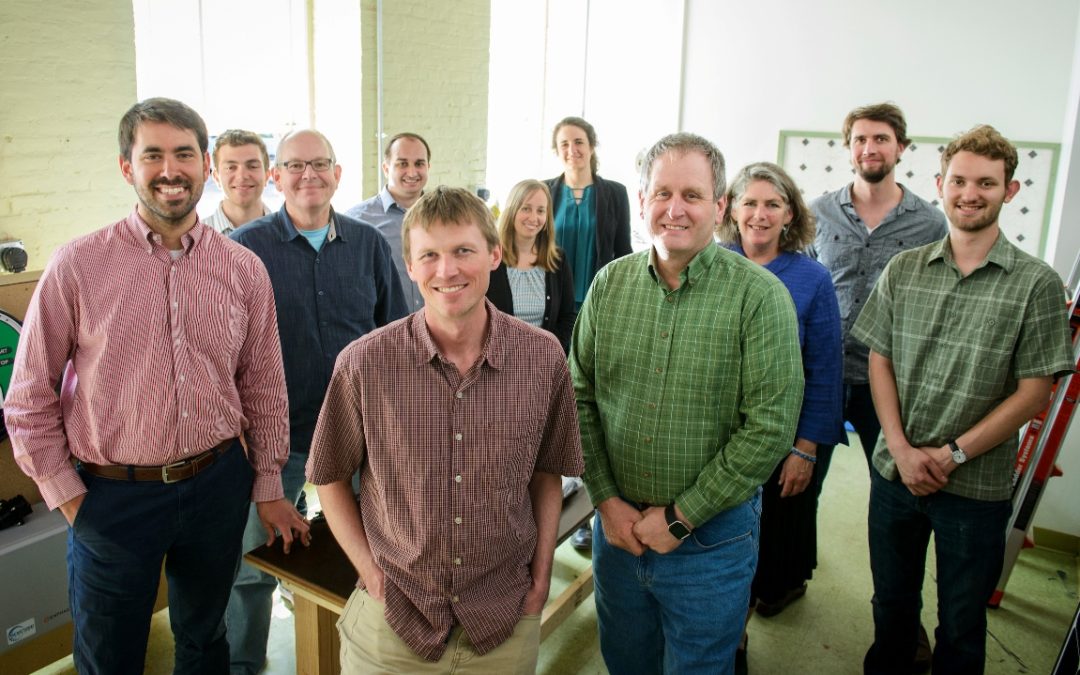Photo by Erica housekeeper | Jesse Thornburg of Grid Fruit holds a sensor beacon at Mach’s Market in Pawlet. The sensor beacon measures certain characteristics of the environment where they’re placed—such as a refrigerator or freezer—and send those measurements to a nearby microcomputer.
Written by Kelly Nottermann, Vermont Sustainable Jobs Fund
Passionate about climate change and sustainability, Jesse Thornburg and Javad Mohammadi met in Pennsylvania through their respective research on ways to reduce energy demand on the power grid—the key, they felt, to reducing greenhouse gas emissions and slowing climate change.
Thornburg came from a renewable energy background, while Mohammadi had worked with utilities, but they both came to the same conclusion: big companies, including Google and Honeywell, were making headway in the residential space, but there was one niche not being targeted by the biggest players—commercial refrigeration.
Drawing on their respective experience and shared research, Thornburg and Mohammadi launched Grid Fruit in late 2018 to reduce costs and emissions by bringing data-driven intelligence to food retail operations.
Energy Star estimates that refrigeration constitutes up to 40 percent of the total energy in supermarkets, grocery stores, or convenience stores, but Thornburg says that most U.S. stores don’t measure refrigeration demand separately from store consumption as a whole, let alone use that data in day-to-day decision making.
“Renewables are increasing in prevalence,” said Thornburg. “That’s the supply side of the equation and we’re all for that. But there also needs to be responsiveness on the demand side. Big companies are seeing that and working on residential solutions, but no one is focused on the smallest class of commercial buildings that rely on consistent refrigeration.”
Gib Mach, owner of Mach’s Market in Pawlet, Vt. and one of Grid Fruit’s first clients agrees. Mach recently installed 146 solar panels on the roof of his building and hopes to install a hydro-electric station in the future. Mach is “all about climate change” and says Grid Fruit is just what he was looking for.
“It’s an opportunity to get involved,” says Mach. “I want my business to be as efficient and cost effective as possible and Grid Fruit offers a sophisticated way for me to manage energy use.”
Using data to shift energy demand.
Refrigerators and freezers use compressors to keep temperatures within an optimal range. When the temperature drifts up toward the maximum of that range, the compressor turns on to cool the unit—that’s the typical humm you hear from your refrigerator at home. In a commercial setting, Thornburg and Mohammadi found that compressors in multiple units are often running at the same time and are not controlled by centralized digital controls like you might have with smart home devices. Many grocers use legacy systems that either don’t collect data or, if they do, send the data to the cloud and never use it outside of maintenance emergencies.
Grid Fruit collects that existing data and also supplies small sensors to units that do not have data collection capability. These measurements of temperature and power characterize how the refrigerators and freezers are running. That data is then run through an algorithm that returns recommendations for optimizing energy use—for example, staggering compressor cycles or the timing of defrost—to flatten demand.
The company also helps grocers be responsive to alerts sent from utilities to shift power to or away from certain times of day depending on anticipated load on the grid.
“The total effect is reduced demand during peak times which is good for global warming and, because it reduces expensive spikes in energy use, good for the business owner as well,” said Thornburg. “The two work hand in hand.”
For example, if Green Mountain Power anticipates a surge in energy demand on a hot day when people are running their air conditioners, they might send an alert asking customers to shift energy-intensive events to evening. Grid Fruit can manage that event for store owners, shifting a scheduled defrost, for example, to an off-peak time of day. The store owners get access to a customized dashboard where their information is available in real-time and they can participate as much, or as little, as they choose for each event.
Starting up during a shutdown.
The company was just beginning to gain some traction when COVID-19 hit in 2020. “We had a couple of signed non-disclosure agreements,” said Thornburg, “but no one wanted to move forward amid such uncertainty, so we were a little stuck.”
Taking the pause as an opportunity to dig deeper into their business and marketing plans, the founders looked into accelerator programs. “DeltaClime’s Energy 2021 cohort was a great fit for us,” said Thornburg, “and once we realized it was going to be virtual, we jumped on the opportunity.”
Based in Tennessee at the time, Thornburg was thinking about bringing the business to Vermont and saw the DeltaClimeVT Energy 2021 accelerator program as a way to test the waters before committing to a move.
“DeltaClime helped us focus on business plan fundamentals that were critical to us as technical co-founders without formal business training,” he said. “The active participation of the utilities was really exciting and left us with the impression that Vermont is a small and agile place to be an energy startup.”
Grid Fruit won a pilot with Green Mountain Power through the program, prompting the company’s expansion to Brattleboro where they currently have two pilots underway, including Mach’s Market, and are in conversations with a commercial baker. The five-person team is complemented by a three-person research team at the University of Tennessee.
Power in numbers.
The pilots, along with the relationships the company is developing with DeltaClimeVT sponsors Green Mountain Power and Efficiency Vermont, are the starting point for a bigger vision where Grid Fruit is managing not only individual stores but also looking regionally at their collective power use and making adjustments accordingly.
“Eventually, we want to offer a plug and play option for small stores that immediately connects individual stores into this network across the service territory, across the state, or beyond,” said Thornburg. “Within a store, we can balance eight to 20 or more units, but there is a much larger benefit to the grid if a number of stores within the area are signed on.”
Thornburg would like to enroll larger chains, food manufacturers, and shipping facilities—really any business that relies on refrigeration.“We see this as a way to network clients that are reliant on refrigeration that has traditionally been very inefficient and run without consideration for the unit next door or across the street. We want to give them an opportunity to individually and collectively make a difference on climate change.”
Geoff Robertson, Managing Director of the DeltaClimeVT business accelerator program, is currently recruiting entrepreneurs like Thornburg and Mohammadi for the DeltaClimeVT Energy 2022 cohort, which will be focused on energy-related products and services that reduce the need for costly infrastructure or electrical panel upgrades.
“We are particularly interested in services and technologies that have wide potential applicability with rural populations and that enable small businesses, low and moderate-income Vermonters, disadvantaged populations and multi-family building residents to participate in the low-carbon economy,” said Robertson.
Selection will focus on companies that are currently at a pilot or demonstration stage and planning for scale. Applications for the Energy 2022 cohort are due by January 31, 2022. For more details, visit deltaclimevt.com or contact Geoff Robertson at 802-828-3753.
About DeltaClimeVT – A Climate Economy Business Accelerator
Managed by the Vermont Sustainable Jobs Fund (VSJF), the DeltaClimeVT business accelerator is a Vermont-based program serving startup and seed-stage ventures focusing on energy and climate economy innovation. The program provides an intense accelerated learning and business development process designed to test assumptions, expose and remediate business vulnerabilities, prepare for significant investment, and provide a platform for rapid scaling. As a proven leader in sustainability, Vermont offers participants access to a large number of entrepreneurial climate economy and energy experts throughout the program.




